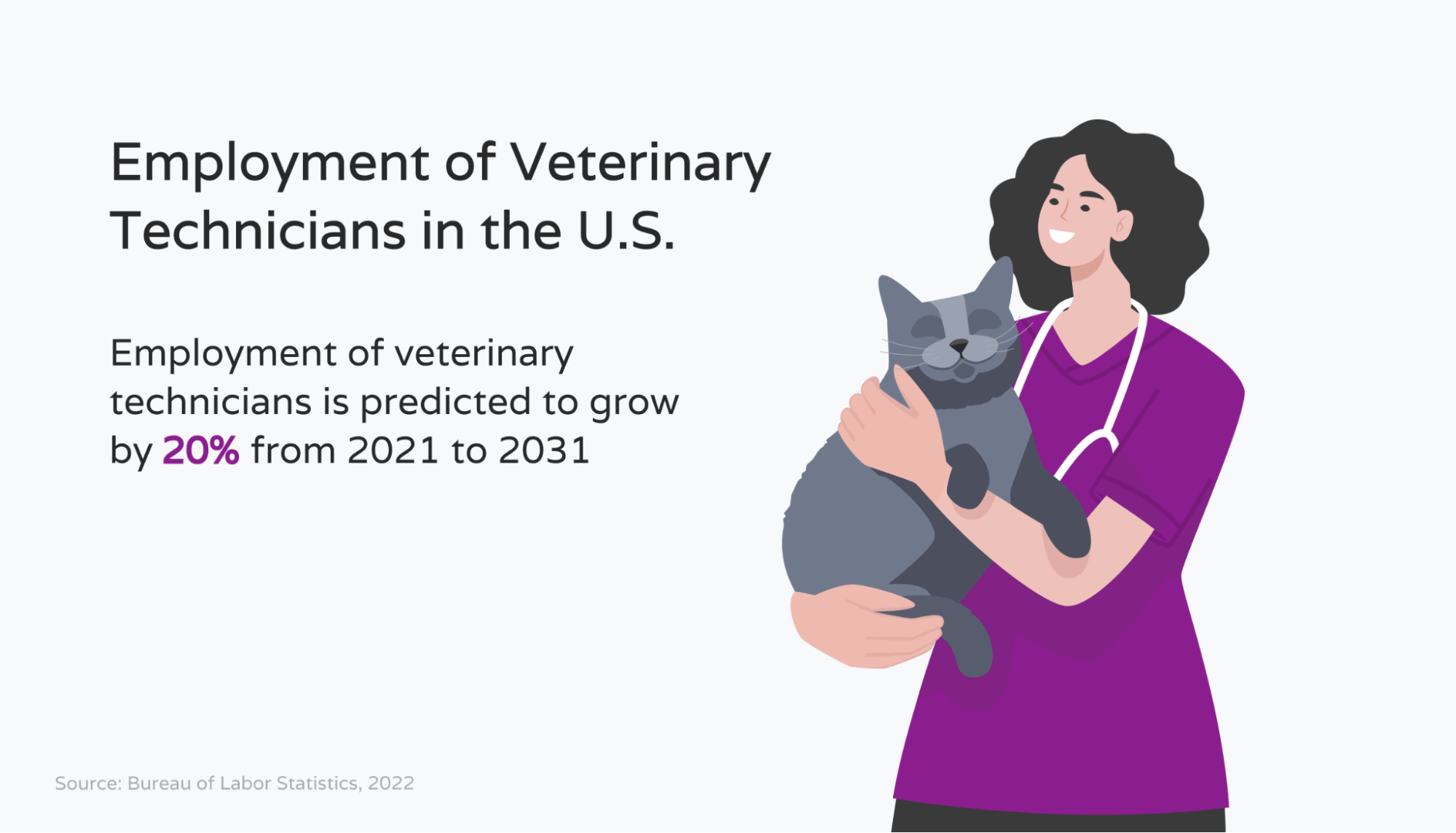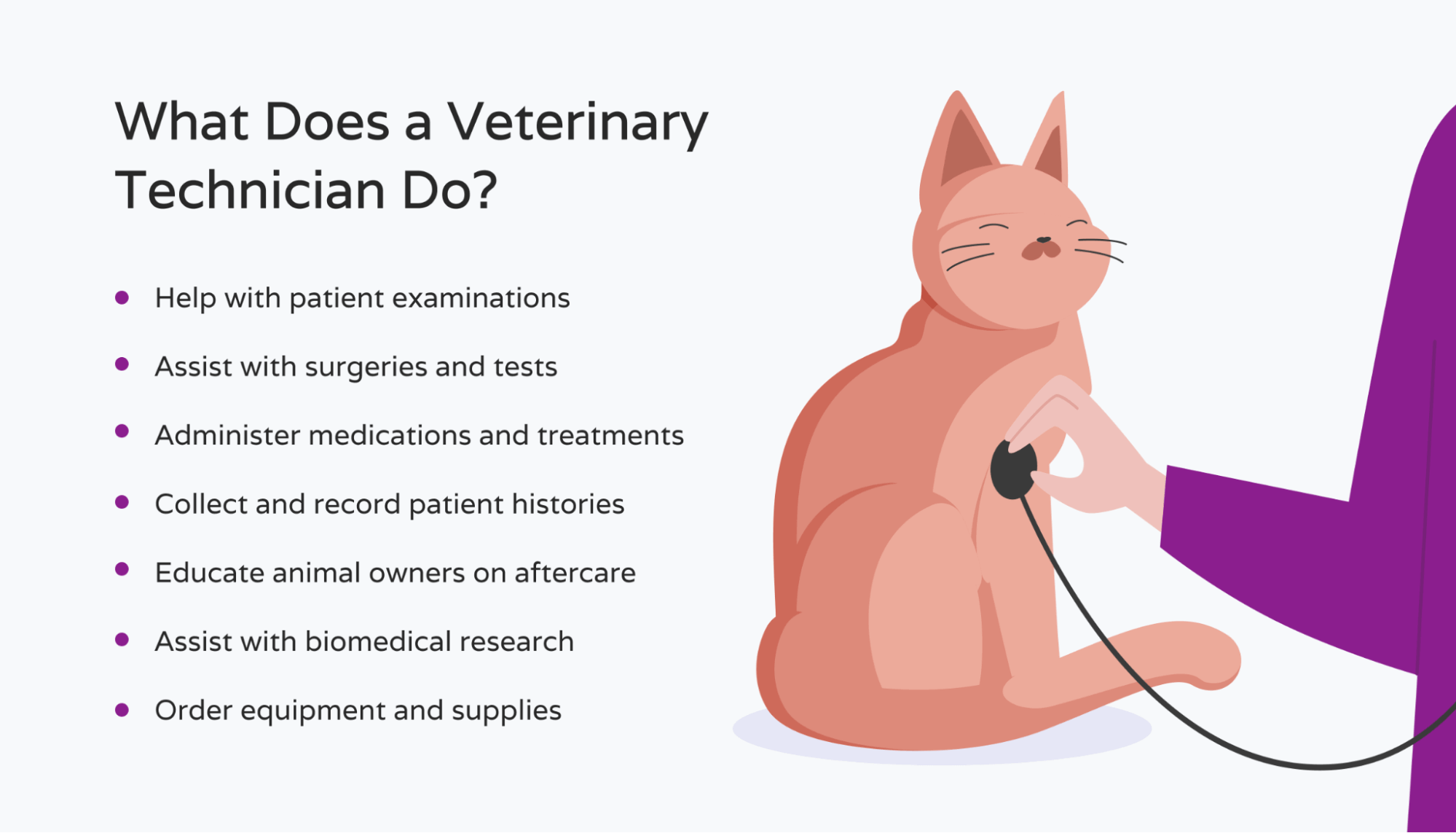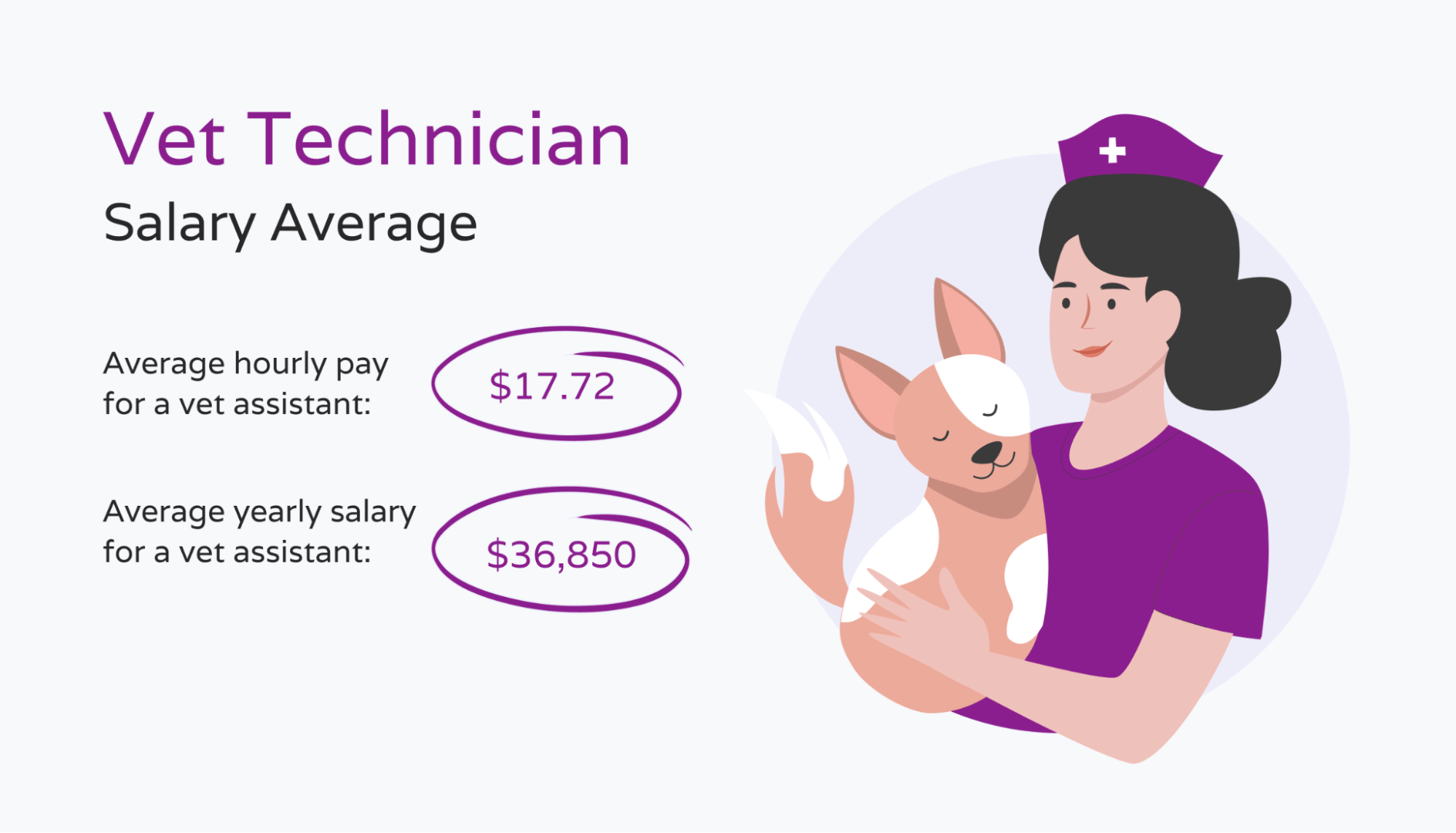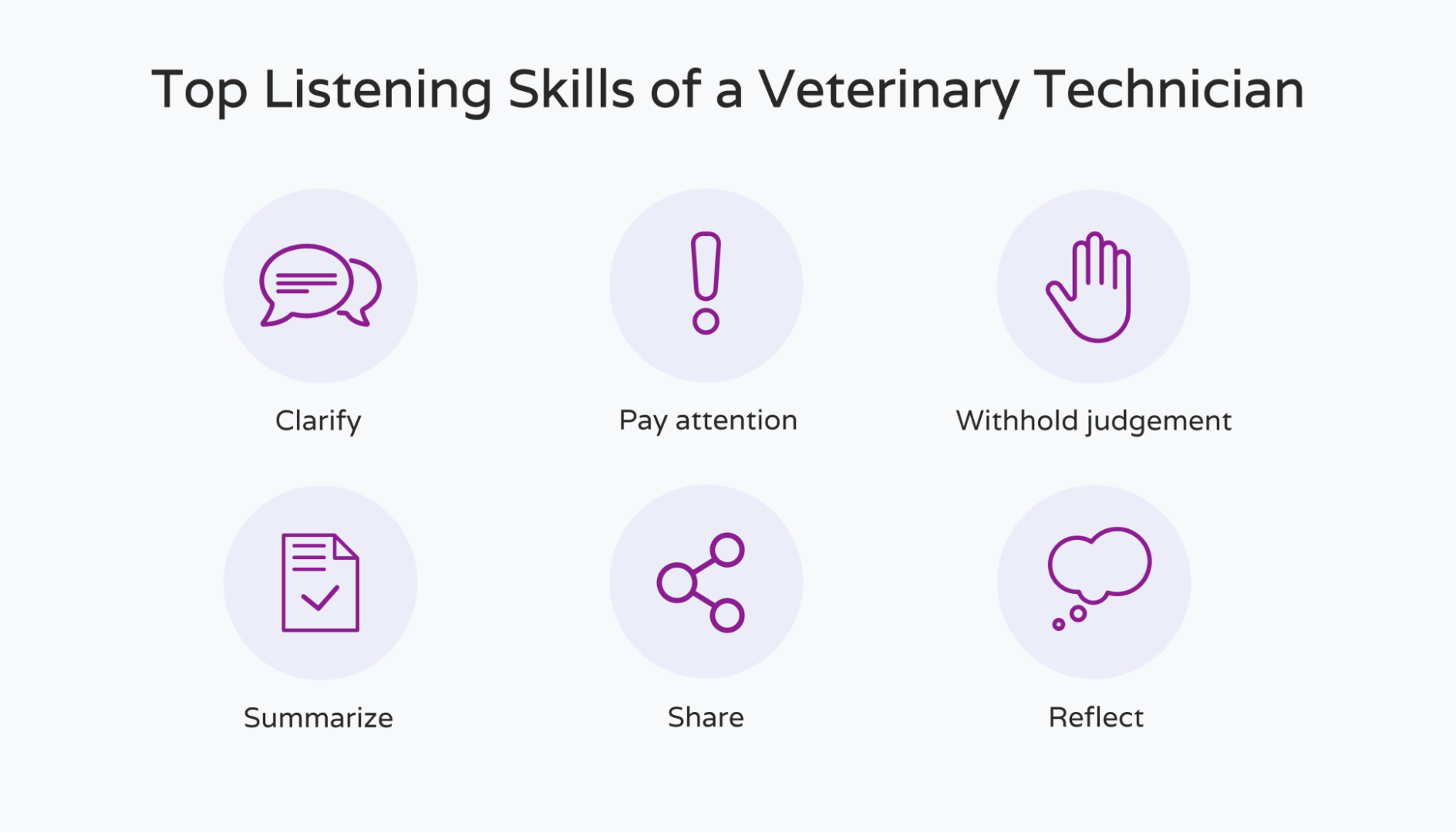Are you struggling to give adequate time and attention to all your veterinary patients?
Do you feel like you and your in-house staff are drowning in the sheer volume of tasks to perform every day?
Then a vet tech might be the perfect solution.
But what is a vet tech? What are the essential vet tech duties, including daily responsibilities, required skills, and salary expectations? And, most importantly, how can they help your business grow?
This article will delve into what a veterinary technician is, what their duties are, and how they benefit your practice. We’ll also look at what you can expect to pay them and more so you can decide if hiring one is the ideal solution for your practice.
What is a veterinary technician?
A vet technician performs different tasks to treat and provide care for animals. These include preparing vaccines, taking samples, and performing tests to help diagnose and treat pets’ diseases and illnesses.
Employment of veterinary technicians is predicted to grow by 20% from 2021 to 2031 – much faster than average for all occupations.

There are about 15,500 openings for veterinary technicians each year in the U.S. alone. This indicates that the need for these technicians is increasing by the year.
Requirements and education
Veterinary technicians need to have a strong background in mathematics and biological sciences.
They also need a degree or equivalent accredited by the American Veterinary Medical Association. Upon completion of the program, they need to pass the National Veterinary Technician Exam to become eligible for a license.
Some veterinary technicians may also be required to learn additional skills through formal or informal training, such as how to use specific software programs or computer systems.
Common vet tech duties
Here are some common responsibilities that vet technicians perform.

Let’s take a closer look.
Help with patient examinations
Vet technicians help licensed veterinarians with pets’ physical exams. They help to restrain animals during exams, prepare tools and supplies, and provide the veterinarian with anything else they may need to perform these examinations.
Assist with surgeries and tests
Vet technicians also help veterinarians with surgical procedures and medical tests.
They’re often required to prepare animals for surgery, run laboratory tests, take and process x-rays, clean and sterilize equipment, monitor vital signs, give anesthesia to animals, and more.
Tests and surgeries differ depending on the type of pet and its size.
Administer medications and treatments
Vet technicians are often required to provide pet owners with medications, treatments, and vaccines based on the veterinarian’s instructions. They need to give clear instructions to ensure that pet owners administer their pets’ medications correctly.
Collect and record patient histories
When new patients arrive, vet technicians need to record their basic information, such as their weight, breed, and age. They also need to obtain and update patient records as pets receive new treatments.
Educate animal owners on aftercare
After a pet’s treatment or surgical procedure, a vet tech needs to educate the owner on how the aftercare treatments need to be administered. This helps keep the pet’s injury or illness from getting worse or resurfacing.
Assist with biomedical research
Vet technicians will sometimes need to perform market and biomedical research to stay up to date with the latest medications, treatments, and more. This helps the veterinary practice to remain competitive and provide the best possible solutions to its patients.
Order equipment and supplies
Vet technicians are also often required to order supplies and equipment. To make the process easier and more efficient, they can determine when supplies tend to run out every month and make sure they order new supplies in advance.
Additional services
Some veterinary technicians may also be required to perform clerical duties, such as responding to client emails, answering phone calls, and assisting with bookings.
A veterinary virtual assistant can perform many of these services at a fraction of the cost of an in-person veterinary technician.
They can communicate with clients, order stock, create patient records, and much more. Hire a veterinary virtual assistant from Hello Rache today.
Learn the differences between a veterinary technician and a veterinary virtual assistant.
Where do veterinary technicians work?
Veterinary technicians can work in many different environments.
Animal hospitals and private veterinary clinics are their most common workplaces. However, they can also work in laboratories, zoos, farms, pet shelters, and even universities.
Their schedules may differ from workplace to workplace. While many of them work during business hours, they are often required to come in during emergency situations and to provide critical animal care.
Benefits of hiring a vet tech
Here are the top four advantages of hiring a veterinary technician for your practice.
1. Better customer service
90% of customers say they spend more with businesses that personalize the customer service experience.

Pet owners tend to be extremely passionate about their pets – in fact, in many ways, their pets are like children to them. This is why exceptional customer service and support are an absolute must for all veterinary practices.
A veterinary technician will help your practice provide great customer care by answering customer questions, helping them with aftercare, providing them support whenever they need it, and more.
As a result, clients will see that your practice truly cares about their pets and will continue to come back. They may even refer you to friends or family who have pets of their own.
2. Lighter workload
Vet technicians can take over many daily tasks, such as answering customer queries, making travel arrangements, and performing market research.
This will lighten the workload for both you and your in-house team so that you have more time to focus on the more important tasks that’ll help your business grow.
This means you’ll have more time to spend with your patients – which will also contribute to an excellent customer experience.
3. Higher levels of productivity
Removing many of the clinical tasks means your in-house team will have more time to focus on their own work. As a result, they’ll be more productive and better able to complete their work on time.
This will make your business processes run more smoothly, creating a far better, less stressful work environment and a positive company culture.
4. Save money
If you hire a virtual veterinary assistant, you’ll save a lot of money while removing much of the weight from your shoulders.
You won’t have to spend countless nights working overtime and trying to finalize business tasks. Instead, your virtual assistant will be able to perform all of these tasks remotely.
Articles You Might Also Like:
Key Veterinary Assistant Duties That Help Grow Your Practice
3 Steps to Remove the Burden of Preauthorizations in Your Practice
Vet technician salary
Office-based vet technicians earn around $17.72 per hour with an average salary of $36,850 per year.

However, their salaries can increase based on several different factors, including their location, experience, skills, and education.
Location
Those who live in the following states earn between 5% and 25% more than those in other states:
- Nebraska
- Wyoming
- New York
- Connecticut
- California
- Colorado
- Washington
- Oregon
- Alaska

On the other hand, those who live in states such as Maine, New Hampshire, Arizona, Iowa, North Dakota, and North Carolina often earn between 5% and 14% less than average.
Experience
Some veterinary technicians may also earn more than others based on their level of experience.
For example, vet technicians with more than 20 years of experience often earn around $5 more per hour than those who have less than a year’s experience.
If you do the math, this equates to around $40 more per day (if they work eight hours) or $880 more per month.
Skills
Vet technicians with the following skills can also earn a lot more than average.
- Oncology skills: 24% more
- Scheduling skills: 15% more
- Intensive care unit skills: 14% more
- Team leadership skills: 12% more
- General surgery: 9% more
- Inventory management: 8% more
- Training management: 7% more
Education
Veterinarian technicians with a Veterinary Technician Certificate earn around 8.82% more than those who don’t have this certificate.
Furthermore, those who have undergone clinical trials can earn a whopping 31.71% more than average. And those with a Veterinary Medicine Degree can earn 22.42% more.
Virtual veterinary assistant salary
You can hire a HIPAA-certified veterinary virtual assistant of your choosing for a flat fee of $9.50 per hour. You’ll also be able to cancel at any time, and no contract is required.
Learn more about hiring a virtual veterinary assistant for your practice here.
Skills to look for when hiring a vet tech or virtual assistant
Here are some of the top skills to look out for when hiring a vet tech.
Customer service
A vet tech needs to be excellent at customer service and willing to go out of their way to make the experience as pleasant for clients as possible.
They’ll have to answer client questions in a timely manner and assist them with anything they may need, such as payments and general pet health-related questions.
Communication skills
Your vet tech or assistant needs to have the following communication skills:
- Verbal communication for answering phone calls and talking to clients and suppliers in a friendly and professional manner.
- Non-verbal communication for communicating with clients and suppliers via different online platforms, such as email or through a website.
They also need to have solid spelling and grammar skills to ensure that their words are professional and easy to understand.
Listening skills
Since vet technicians assist veterinarians with various tasks, they need to be able to listen to instructions. The slightest mistake can lead to dire consequences.

They’ll also have to listen to clients and make sure that messages are relayed to the appropriate personnel. For example, if a client is having a payment-related issue that the vet tech can’t handle themselves, they’ll need to relay the problem to someone in the finance department.
Dependability
A vet tech or virtual assistant needs to be reliable and show up to work on time. Furthermore, when a veterinarian asks them to perform certain tasks, they need to do it on time so that clients remain happy and business processes can continue to flow.
Attention to detail
Since the veterinary industry is all about pet health and making sure that the best possible treatments are provided, vet techs need to be great at looking at the smallest details.
For example, when a veterinarian asks them to administer medication, the vet tech needs to make sure that they know exactly what and how much medication they need to give.
Knowledge of the veterinary industry
A vet technician or virtual assistant needs to know medical terminology and should also be knowledgeable of certain treatments and medications.
Certification in HIPAA training is preferred, and a background in the veterinary profession is a big bonus.
Hire someone to help your practice today
Hiring someone to help you with your workload will give you more time to spend with your patients and lead to a far more positive work environment.
Whether you choose to hire a veterinary technician or a virtual veterinary assistant is up to you. If you want someone who can assist you with operations and hands-on treatments, a vet tech would be ideal.
On the other hand, if you need someone to reduce the burden of everyday tasks and take care of administrative duties while providing excellent customer service, a virtual assistant would be perfect.
Considering hiring a virtual assistant but don’t know what to expect?
Learn more about what a virtual assistant is or book a call with our team today to learn how Hello Rache can save your practice time and money.
Discover what Hello Rache can do for you and your practice
Tell us a little about your practice & we will contact you within 24 hours.
SCHEDULE A CONSULTATION




